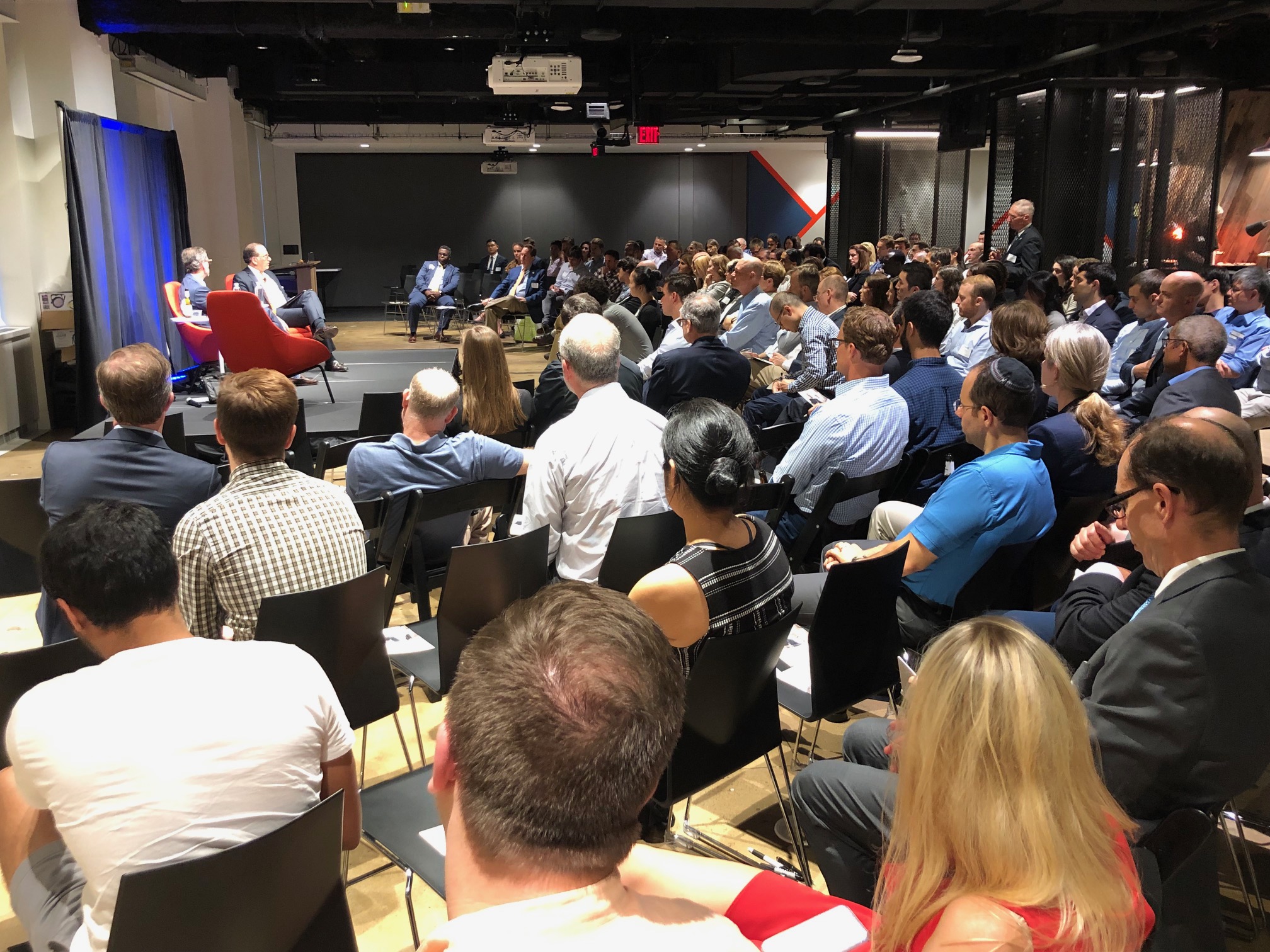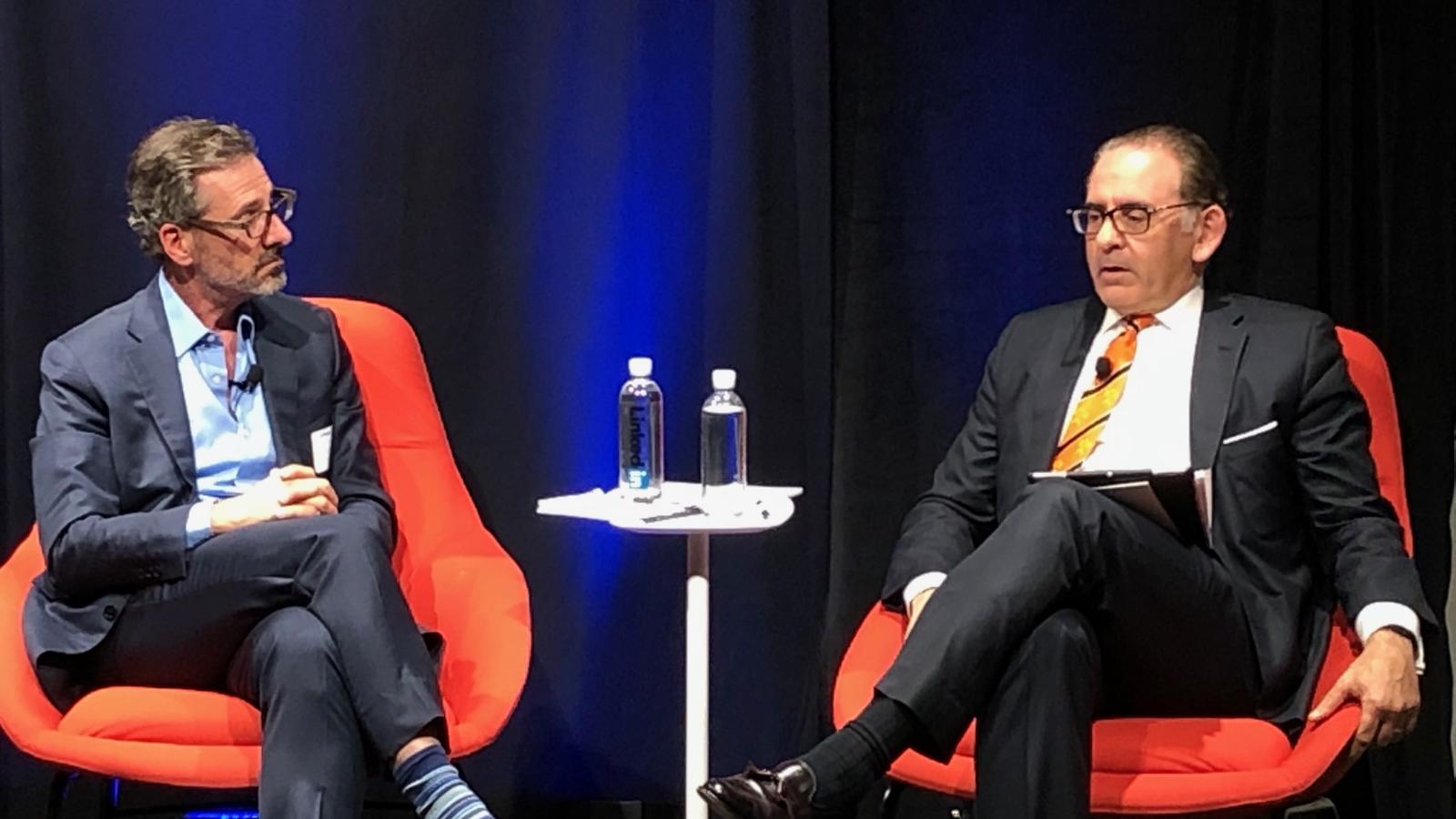More than 150 Yale and Princeton alumni recently gathered in New York City for an in-depth discussion on quantitative finance led by two leading experts.
The program was organized by YaleFin – a nascent shared interest group for alumni in banking and finance – in collaboration with the Princeton Association of New York City (PANYC) and hosted by LinkedIn Corporation at their offices in the iconic Empire State Building.
The event revolved around the expertise and insights of Mark Carhart ’88, chief investment officer at Kepos Capital, a $2.5 billion hedge fund he founded in 2010, and Jeffrey S. Wecker (Princeton ’84), a partner and chief data officer at Goldman Sachs. The two men offered their thoughts and perspective on the enormous opportunities, challenges, and complexities of the use of mathematics, statistical models, and extremely large data sets to analyze financial markets, assets, and securities.
The event was spearheaded and emceed by Brian Hammerstein ’85, who knew both speakers through alumni and personal circles, respectively, and was excited about bringing Yalies and Princetonians together via an engaging program of mutual professional interest.

“I thought having the two of them on stage in front of alumni from their respective undergraduate institutions of Yale and Princeton would make for a compelling offering,” said Hammerstein.
The value and benefits of commingling the two alumni communities were not lost on participants.
“Combining the groups provided a robust opportunity for networking,” said Nancy Stratford ’77, a portfolio manager for private investors and chair of the Yale Alumni Association Board of Governors.
While optimistic about the use and advantages of big data, Carhart and Wecker were fully cognizant of the risks and vulnerabilities, including privacy concerns and challenges of regulating access to information.
“The need to know in a digital world is more difficult due to scale,” said Wecker.
With the rise in recent years of major data breaches involving U.S. companies and businesses and government agencies, audience members were keen to hear more about data security. That included Ellen Ryan ’77, a consultant and musician, who during the Q&A session inquired about the measures being taken to validate, protect, and ensure the quality of critical data sets.
“I am particularly interested in data integrity due to its impact on finance and other data-dependent areas – national security, resource management, health care, climate analysis, risk assessment, infrastructure, etc.,” said Ryan.
Despite genuine and legitimate concerns, Carhart and Wecker agreed that the banking and finance world will increasingly rely on big data and emerging technologies to assess risk, improve processes, and make better investment decisions.
Albeit unsurprising to industry veterans and professionals, even they marvel at the degree to which big data has transformed their field.
“When I first worked for a securities firm, a good day was 20 million shares traded on the New York Stock Exchange,” said Tom Opladen ’66, co-chair of YaleFin, who worked in investment banking his entire career, focusing on financing corporations. “Today there are billions of shares traded in a day, plus many other financial instruments. All of this information is stored in many databases.”

Accordingly, said Carhart, demand for data talent will continue to grow with barriers to entry easing up, particularly for those with the requisite technical skills and real-world experience – but not necessarily with the highest academic credentials or certifications.
“You don’t need a PhD in machine learning to go far,” said Carhart. “We need more people interested in or digging for more insights.”
He emphasized the value of big data is ultimately determined not so much by the collection and accumulation of raw information but rather its conversion into an effective “forecast” tool.
“Everything is tied to the impact of what we’re doing,” said Carhart.
The discussion and overall program was well-received, providing Yalies and Princetonians alike an evening of intellectual enrichment, social bonding, and community engagement – with participants enthusiastic about future joint events and initiatives.
“We definitely look forward to further rewarding collaborations between NYC Tigers and Bulldogs!” said Robert Wolk (Princeton ’91), president of PANYC, who is a private investor and managing partner at Wolk Family Office.
Sulexan Chery ’15 MBA, co-chair of YaleFin and a credit risk officer at AIG Asset Management, expressed his hope that besides enjoying the program, participants gained a better understanding of YaleFin and its value to the alumni community.
“I hope attendees have a better sense of our mission to (1) connect the incredible base of Yalies in finance with peers working in various sectors, functions, and geographies, and (2) host interesting events for their professional development,” said Chery.
###
For more information about YaleFin, contact them via email and see their page on the Groups section of the YAA website.





